====================
A homily offered by the Rev. Dr. C. Eric Funston on the Eighth Sunday after Pentecost, July 10, 2016, to the people of St. Paul’s Episcopal Church, Medina, Ohio, where Fr. Funston is rector.
(The lessons for the day are Proper 10C of the Revised Common Lectionary: Deuteronomy 30:9-14; Psalm 25:1-9; Colossians 1:1-14; and St. Luke 10:25-37. These lessons may be found at The Lectionary Page.)
====================
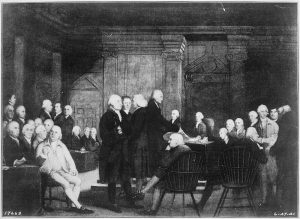 Last Monday, we celebrated our country’s 240th birthday in a way that is quite different from other celebrations of what we might call “national identity days” around the world.
Last Monday, we celebrated our country’s 240th birthday in a way that is quite different from other celebrations of what we might call “national identity days” around the world.
The French, for example, will have a similar celebration later this week on July 14, Bastille Day, which commemorates the storming of the Paris prison by armed revolutionaries.
England celebrates a major holiday in November called “Guy Fawkes Day” –
Remember, remember!
The fifth of November,
The Gunpowder treason and plot;
I know of no reason
Why the Gunpowder treason
Should ever be forgot!
The day commemorates the attempt, the failed attempt to blow up the Parliament.
The Soviet Union celebrated May Day as a great “international workers’ holiday;” it commemorated the Haymarket riot in Chicago in 1886 when police shot and killed four striking laborers.
Russia now celebrates a large national holiday on May 9 called “Victory Day” which commemorates the defeat of Germany in World War II.
Mexico’s Independence Day is September 16, which commemorates the date on which a radical priest named Miguel Hidalgo y Costillo led an armed assault on the jail in the small town of Dolores in the state of Guanajuato.
Each of these national days commemorates an act of violence: the storming of a jail, a war, a riot, an attempted bombing. Our “national identity day,” on the other hand, celebrates something different: July 4 is not the anniversary of “the shot heard around the world” when our war for self-government started, nor is it the anniversary of the Battle of Yorktown where we finally defeated the British and won our independence.
What we celebrated on Monday is simply the anniversary of a vote taken in the Second Continental Congress. That’s all that happened on July 4, 1776. The delegates to the Congress voted to accept the text of the Declaration of Independence. They didn’t even sign it on that day; they just voted to accept it. What we celebrated on Monday is the ability of people to work together democratically, to overcome division and disagreement, and to reach wise decisions through conversation, compromise, and consensus, securing freedom and liberty for all.
What we, as a nation, have endured during the rest of this week is something else . . . .
In our gospel lesson today, a lawyer approaches Jesus with a question, “What must I do to inherit eternal life?” Jesus, in good rabbinic (or Socratic) form, responds with a question, “What do you read in the Law?” The lawyer answers, “Love God . . . and love your neighbor.” Jesus tells him he has answered correctly and seems to be ending the conversation, but the lawyer persists, as lawyers are wont to do, asking, “But who is my neighbor?”
At this point, Jesus changes the nature of the conversation. It is no longer a law school question-and-answer session. Instead, Jesus tells a story . . . a story which we no longer hear with the jarring surprise and astonishment undoubtedly experienced by Jesus’ first audience. We no longer hear the word “Samaritan” as they did, and this parable is part of the reason why.
I have a friend who is the business manager for a charity in Kansas City called “Samaritan’s Purse.” It’s a great name. It calls this very story to mind, and it illustrates precisely what the word “Samaritan” means to us: it means someone who aids or assists another, particularly another who is in a crisis. But that is not what it would have meant to the lawyer who questioned Jesus or to those who overheard their conversation.
The Samaritans were and are (there still are Samaritans living in Palestine today) a group whose ethnic and religious roots are the same as the Jews. Both groups claim to be descendants of Abraham and Isaac; Jews claim descent through Judah; Samaritans claim descent through the sons of Joseph, Ephraim and Manasseh. Samaritans claim to be the true preservers of the ancient Hebrew religion; Jews make that claim for themselves, and Samaritans as syncretists and heretics who are, moreover, racially impure.
That latter claim derives from the time of the Babylonian Exile during which the exiled Jews claimed to have maintained racial purity while they accused Samaritans, who remained in Palestine, of having intermarried with Assyrian immigrants producing a mixed-breed “race” inferior to the Jews. The Jews of Jesus’ time refused even to acknowledge Samaritans as a “tribe” or a “nation”; they called them a “herd”. Jews made fun of the name of a principal Samaritan city, Shechem, referring to it instead as “Sychar,” a word which may have meant either “drunkenness” or “falsehood.” (See Sychar in International Standard Bible Encyclopedia, online) “A widely current proverb, which is recorded in the Talmud, said that ‘a piece of bread given by a Samaritan is more unclean than swine’s flesh.’” (See Korb, Scott, Life in Year One: What the World Was Like in First-Century Palestine, Riverhead Books:New York, 2011, pp 138-40)
This then is how Jesus’ first audience, the lawyer and the bystanders, and Luke’s first readers would have heard this parable: it is a story about someone receiving aid from a member of an inferior race characterized by drunkenness and lying, from whom receiving even the simplest gift makes one accursed and impure. This is a story about racial division and about love and neighborliness reaching across an almost unbridgeable ethnic and religious separation.
And it directly addresses the terrible things that have happened in our nation during this week after the Fourth of July, the deaths of Alton Sterling and Philando Castile at the hands of police, and the deaths of five police officers at the hands of a troubled sniper.
The Old Testament lesson today is from Moses’ farewell discourse to the Hebrews, the ancestors of both the Jews and the Samaritans, as they are ending their long journey out of slavery in Egypt and into the promised land of liberation and freedom. Moses reminds them that “God will make you abundantly prosperous in all your undertakings” if you just obey the law (that’s a collective “you,” by the way; a promise to the community, not to any one individual). This is the same law that Jesus and the lawyer have agreed is summarized in two short admonitions: “love God” and “love your neighbor.” And then Moses pauses and asks the Hebrews a rhetorical question: “Surely, this commandment that I am commanding you today is not too hard for you . . . ?” It is not, he reminds them, far away: “The word is very near to you,” he says, “it is in your mouth and in your heart for you to observe.”
Mark Labberton, a professor at Fuller Theological Seminary, summarizes and paraphrases Moses’ words in this way: “Get on with doing with you already know to do. Stop with the excuses, already! Give up waiting for someone else from somewhere else to come and do what in fact you already know to do in your heart and mind.” And then Labberton comments: “We hate that. We say we just want to know what to do, but we don’t. We prefer a good excuse. Moses says that excuses, however, are not a viable, defensible option. He should know. We would rather whine about needing to wait for more insight. We would rather lose ourselves in alleged complexity.” (The Art of Deflection) But complexity is not an excuse! In any event, it’s not complex! As Jesus says, it’s as simple as “Love God. Love your neighbor.”
From the fall of 1966 through the spring of 1969, I was a cadet in the Army ROTC at St. John’s Military School in Salina, Kansas. Among the many things that we were taught in that program was how to use and take care of a variety of weapons, including the M-16, a rifle we are now more familiar with in its civilian variant, the AR-15. A couple of times each academic year we were required to demonstrate our proficiency with the weapon, which meant not only firing it at gradable targets, but also showing that we could disassemble it and put it back together within regulation time, blindfolded. The weapon is a complex piece of equipment; it has a lot of parts. But once you learn the rules, the steps of disassembly and reassembly, it’s simple to do. I haven’t touched that (or any) weapon in 47 years, but I’m pretty sure I could still take one apart and put it back together because I learned the rules by heart; they are etched in my mind even nearly a half-century later. I always qualified as a sharpshooter or better, and never failed the disassembly-reassembly test. Complexity is not an excuse.
The events of the past week, the week after the Fourth of July, scream “Complexity!” at us. There are so many parts that we must address. Like the Jews, Samaritans, and Gentiles of First Century Palestine, we live in a racially, ethnically, religiously, and economically divided society, and we are terrified by it . . . some more than others. My heart broke this week as I watched Valerie Castile, the mother of Philando Castile the man who was shot dead in Falcon Heights, Minnesota, tell a reporter, “I always told him, ‘Whatever you do, when you get stopped by the police: comply. comply, comply, comply. Comply – that’s the key thing in order to try to survive being stopped by the police.” (NY Daily News) This is what is known in the black community as “the talk.”
Reporter Jazmine Hughes in article entitled What Black Parents Tell Their Sons About the Police wrote:
Every black male I’ve ever met has had this talk, and it’s likely that I’ll have to give it one day too. There are so many things I need to tell my future son, already, before I’ve birthed him; so many innocuous, trite thoughts that may not make a single difference. Don’t wear a hoodie. Don’t try to break up a fight. Don’t talk back to cops. Don’t ask for help. But they’re all variations of a single theme: Don’t give them an excuse to kill you.
I wonder if Samaritan parents, whose sons were looked down upon by the surrounding Jewish community as drunks, liars, and animals as unclean and accursed as swine, felt similarly compelled to lecture their children; I wonder of the Good Samaritan had gotten “the talk.”
I cannot imagine what it must be like for parents to feel they have to say such things to their sons, and it is certainly not my place to tell those parents they are wrong the believe that. Frankly, I don’t believe they are wrong but, even if I did, the law written on our hearts does not call on us to argue with our neighbor; it calls us to love our neighbor. If we believe our neighbor misperceives us, we must answer what we think is a wrong perception not with corrective argument, but with corrective love.
The racial divide which separates neighbor from neighbor is not the only issue the events of the past week have illuminated, although it is the one most directly addressed by Jesus’ parable in today’s gospel. There are other issues highlighted by the terrible coincidence that in Dallas a troubled combat veteran of the Gulf wars shot and killed, among others, two other veterans of the same conflict. Micah Johnson, the sniper, had served in Afghanistan; Patrick Zamarippa, one of the dead officers, was a Navy veteran of the Iraq war, and Brent Thompson, another of those killed, was a police operations instructor who had served in both Afghanistan and Iraq. These facts raise issues about the militarization of our police forces, the mental and emotional care (or lack of it) given our veterans, and the ease with which troubled persons (like vets possibly suffering from PTSD) can obtain weapons; these are all among the problems leading to last week’s events. The situation is complex but, Moses reminded the Hebrews, complexity is not an excuse.
My friend the Rev. Dr. Wil Gafney, who teaches theology at Brite Divinity School in Fort Worth, Texas, wrote on Facebook on Friday:
We need to address gun culture in this country. We need to address racism in this country. We need to change police culture and tactics in this country. We need to build bridges between police and the communities they police. And we need to mourn, lament, pray, prophesy, and preach. We need to do the work that needs doing for ourselves, our children, and our society. No matter who is against us and this work, though the forces of hell array against us, we must do this work or none of us shall survive. (Facebook status, July 8, 2016)
And our Presiding Bishop Michael Curry, addressing the General Synod of the Anglican Church of Canada on Friday said:
Just in the last week, a child of God was killed in Baton Rouge, Louisiana; just in the last week, a child of God was killed in St. Paul, Minnesota; and just last night, [in Dallas, Texas] children of God were killed. * * * Enough is enough. * * * Our culture, our society, our world, is begging us, “Show us another way.” (Anglican Journal)
In this week after the Fourth of July, that other way is what we celebrated on the Fourth of July . . . working together, overcoming division and disagreement, and reaching wise decisions through conversation, compromise, and consensus, securing freedom and liberty for all. That other way is the way described by the questioning lawyer and illustrated by Jesus’ in the parable of the Good Samaritan: “[L]ove the Lord your God with all your heart, and with all your soul, and with all your strength, and with all your mind; and your neighbor as yourself.”
The issues we must tackle are many and complex but, as Moses reminded the Hebrews, complexity is not an excuse; we must do this work or none of us shall survive.
Love God. Love your neighbor. Change the world.
Let us pray:
O God, you made us in your own image and redeemed us through Jesus your Son: Look with compassion on the whole human family; take away the arrogance and hatred which infect our hearts; break down the walls that separate us; unite us in bonds of love; and work through our struggle and confusion to accomplish your purposes on earth; that, in your good time, all nations and races may serve you in harmony around your heavenly throne; through Jesus Christ our Lord. Amen. (BCP 1979, page 815)
====================
A request to my readers: I’m trying to build the readership of this blog and I’d very much appreciate your help in doing so. If you find something here that is of value, please share it with others. If you are on Facebook, “like” the posts on your page so others can see them. If you are following me on Twitter, please “retweet” the notices of these meditations. If you have a blog of your own, please include mine in your links (a favor I will gladly reciprocate). Many thanks!
====================
Father Funston is the rector of St. Paul’s Episcopal Church, Medina, Ohio.
 As many of you know, this past week was a harrowing one for my wife and for me; specifically, Wednesday was one of those days you would rather not have to live through. In the afternoon, I was told by a urologist that I probably have prostate cancer, and later that night Evelyn nearly died from pulmonary embolism. She is OK now – I will be leaving right after this service to bring her home from the hospital – and my diagnosis will be either confirmed or proven wrong by a biopsy in about a month.
As many of you know, this past week was a harrowing one for my wife and for me; specifically, Wednesday was one of those days you would rather not have to live through. In the afternoon, I was told by a urologist that I probably have prostate cancer, and later that night Evelyn nearly died from pulmonary embolism. She is OK now – I will be leaving right after this service to bring her home from the hospital – and my diagnosis will be either confirmed or proven wrong by a biopsy in about a month. 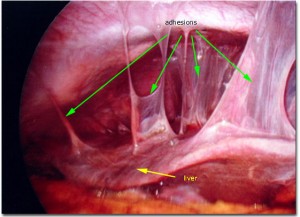 As a human body moves, its tissues or organs normally move and shift, repositioning themselves in relation to one another within a normative range; nothing in the body is static. These tissues and organs have slippery surfaces and natural lubricants to allow this. Inflammation, infection, surgery, or injury can cause bands of scar-like tissue to form between the surfaces of these organs and tissues, causing them to stick together and prevent this natural movement.
As a human body moves, its tissues or organs normally move and shift, repositioning themselves in relation to one another within a normative range; nothing in the body is static. These tissues and organs have slippery surfaces and natural lubricants to allow this. Inflammation, infection, surgery, or injury can cause bands of scar-like tissue to form between the surfaces of these organs and tissues, causing them to stick together and prevent this natural movement. 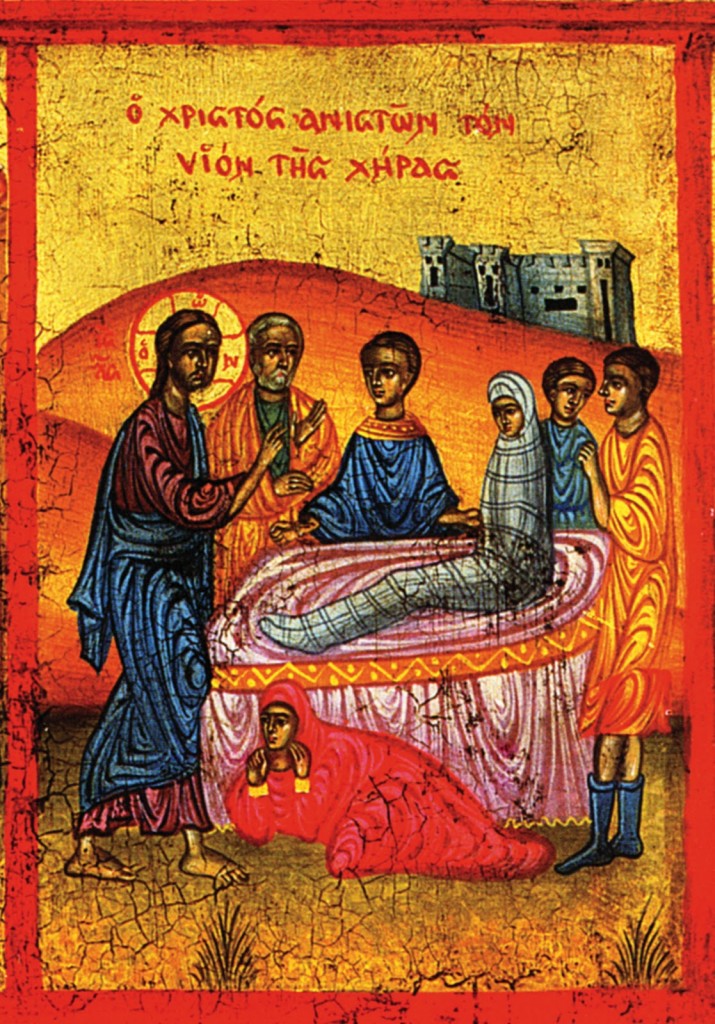 I am convinced that there is no grief quite so profound as that of a mother whose child has died. I know that fathers in the same situation feel a nearly as intense sorrow at the death of their sons or daughters, but having spent time with grieving parents, I am convinced that the grief of a mother faced with the loss of her child is the deepest sadness in human experience.
I am convinced that there is no grief quite so profound as that of a mother whose child has died. I know that fathers in the same situation feel a nearly as intense sorrow at the death of their sons or daughters, but having spent time with grieving parents, I am convinced that the grief of a mother faced with the loss of her child is the deepest sadness in human experience.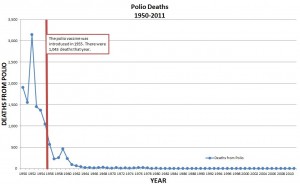 The year that I was born was the worst of the mid-20th Century polio epidemic; about 55,000 Americans contracted the disease that year and more than 3,100 died, mostly children. As a society, we decided that that much illness and death was simply unacceptable, and an all-out effort was underway to put an end to it. Within just a few years, Jonas Salk and his team developed the vaccine which ended the epidemic; a few years later, the Sabin oral vaccine was developed and polio has been just about eradicated throughout the world. (Graphic from
The year that I was born was the worst of the mid-20th Century polio epidemic; about 55,000 Americans contracted the disease that year and more than 3,100 died, mostly children. As a society, we decided that that much illness and death was simply unacceptable, and an all-out effort was underway to put an end to it. Within just a few years, Jonas Salk and his team developed the vaccine which ended the epidemic; a few years later, the Sabin oral vaccine was developed and polio has been just about eradicated throughout the world. (Graphic from 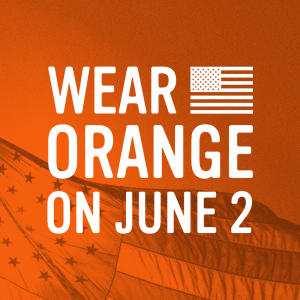 On January 21, 2013, Hadiya Pendleton, a 15-year-old high school student from the south side of Chicago, marched with her school’s band in President Obama’s second inaugural parade. One week later, Hadiya was shot and killed. She was shot in the back while standing with friends inside Harsh Park in Kenwood, Chicago, after taking her final exams. She was not the intended victim; the perpetrator, a gang member, had mistaken her group of friends for a rival gang.
On January 21, 2013, Hadiya Pendleton, a 15-year-old high school student from the south side of Chicago, marched with her school’s band in President Obama’s second inaugural parade. One week later, Hadiya was shot and killed. She was shot in the back while standing with friends inside Harsh Park in Kenwood, Chicago, after taking her final exams. She was not the intended victim; the perpetrator, a gang member, had mistaken her group of friends for a rival gang.  It’s April! When did that happen?
It’s April! When did that happen?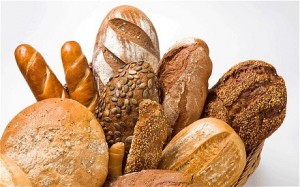 It’s the Second Sunday of Advent so according to our lectionary tradition, we hear the words of John the Baptizer, the voice of one crying in the desert, calling us to clean up the roadways and build a straight path for God’s coming. We are all familiar with the Baptizer. He’s some sort of cousin of Jesus. He’s a bit of a wild man; he lives in the wilderness wearing rough clothing and eating only what foods he can pick from desert plants and animals, “locusts and wild honey” is the way the evangelists put it. This year we hear Luke’s version of John’s story.
It’s the Second Sunday of Advent so according to our lectionary tradition, we hear the words of John the Baptizer, the voice of one crying in the desert, calling us to clean up the roadways and build a straight path for God’s coming. We are all familiar with the Baptizer. He’s some sort of cousin of Jesus. He’s a bit of a wild man; he lives in the wilderness wearing rough clothing and eating only what foods he can pick from desert plants and animals, “locusts and wild honey” is the way the evangelists put it. This year we hear Luke’s version of John’s story. The kingdom of God, of which today we celebrate Christ as king, is not a kingdom of security; it is a kingdom of peace, dangerous peace.
The kingdom of God, of which today we celebrate Christ as king, is not a kingdom of security; it is a kingdom of peace, dangerous peace.

